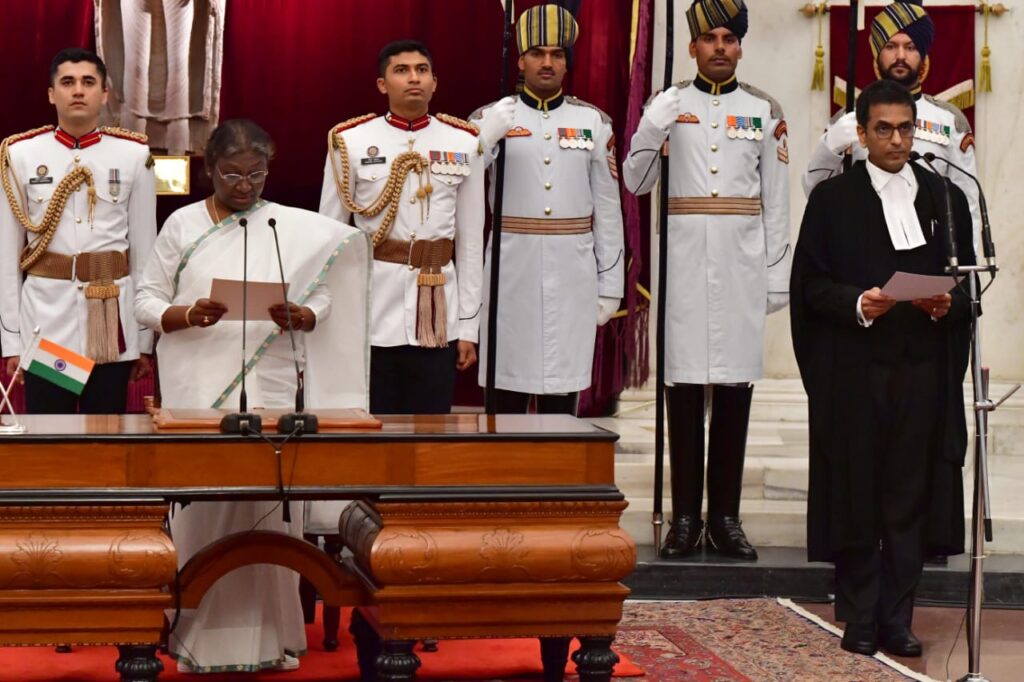Justice D.Y. Chandrachud was sworn in on Wednesday as the 50th Chief Justice of India. He will hold office till Nov 2024.
During his six-year stint as judge in the top court, CJI Chandrachud has earned a name as a liberal icon, as a judge whose heart beats for the marginalized.
In his judgments, he has spoken up for free speech, a woman’s right to choose, her agency over her body and sexuality, and privacy.
In his recent ruling on a woman’s reproductive autonomy, he pushed the frontiers of India’s traditional personal law jaundiced jurisprudence.
His decision allowing all women the right to abort a foetus free of coercion or sans consent of a third party be it partner, husband or in-laws, or boyfriend, has placed Indian women on a better legal footing than even American women.
In the Hadiya, Sabarimala and Section 377 cases, he has extolled the virtues of individual choices in intimate matters such as marriage, right to choose a partner etc.
“… the state has no business to intrude into these personal matters. Nor can societal notions of heteronormativity regulate constitutional liberties based on sexual orientation,” he said.
Liberal icon, has spoken up for women, LGBTs
Feminists, LGBT activists are expectedly pleased as punch. The liberal section is equally thrilled over his judgements on free speech and dissent.
“Dissent is a symbol of a vibrant democracy. Voices in the opposition cannot be muzzled by persecuting those who take up unpopular causes,” Chandrachud wrote in the Bhima Koregaon case.
He dissented from the majority which refused to quash the case. His was also the lone voice which refused to vet Aadhar and its octopus-like grip on an individual’s life and liberty.
He refused to accept seeding of phone numbers with Aadhar on the ground that it posed a grave threat to privacy, liberty and autonomy. Life and liberty are not creations of the Constitution but have only been recognised by it, he said.
In a case involving a challenge to the release of a Bengali movie, he said: “The views of the writer of a play, the metre of a poet or the sketches of a cartoonist may not be palatable to those who are criticised. Those who disagree have a simple expedient: of not watching a film, not turning the pages of the book or not hearing what is not music to their ears.”
“When the ability to portray art in any form is subject to extra constitutional authority, there is a grave danger that fundamental human freedoms will be imperilled by a cloud of opacity and arbitrary state behaviour.”
He backed passive euthanasia on the ground that right to die with dignity was a fundamental right.
Overruled two of his father’s rulings
CJI designate Chandrachud will also go down in history as the only judge who overruled two judgements delivered by his father, former CJI Y.V. Chandrachud.
Chandrachud senior had in a majority declared that fundamental rights can be suspended during an emergency. Chandrachud junior struck it down as wrong, making a historical correction of an error which set the clock of Indian jurisprudence back by decades.
Chandrachud senior said India’s adultery law was legal. Chandrachud junior wrote while striking it down: “We must make our judgements relevant to the present day. The law on adultery is a codified rule of patriarchy.”
It deprives the wife of her sexuality after marriage, he said.
Speaks of agency of a woman
Sexual freedom subsists even in a marriage, he said, a line that has discomfited the conservatives. He repeats that line in his ruling on reproductive autonomy. His very public stance on the right of LGBT community to marry and adopt, and his view that from heteronormativity we must proceed towards accepting plurality in thought and action, will make his stint as the country’s 50th CJI an interesting watch.
Pushed for a more inclusive definition of family
Chandrachud hasn’t hesitated either to push for a broader, more inclusive version of the traditional Indian family.
But will he follow in the footsteps of his rather non-assertive predecessors in sharply polarised issues which will come up for debate in the top court in the days to come?
Issues such as farm laws, electoral bonds, Article 370 and the CAA will come up for adjudication during his tenure.
On political issues, he has gone with the majority
After all, he has gone with the majority in the Justice Loya and Ayodhya cases. He wasn’t tested in the Rafale case although he did hear opening arguments during former CJI Dipak Misra’s time.
The case was heard by two other judges during the tenure of CJI Ranjan Gogoi.
The majority government at the Centre has also had an upper hand on judicial appointments during the tenure of his predecessors.
Collegium recommendations have been often split to suit the executive as seen in the case of Odisha High Court Chief Justice S. Murlidhar.
The Centre is yet to accept the collegium’s decision to transfer him to the Madras High Court.
The transfer may have been a precursor to the unassuming, popular Murlidhar’s elevation to the top court but has been withheld for now.
As Delhi High Court judge Murlidhar had ordered Delhi police to file FIRs in the Delhi riots and pushed for humanitarian relief for the riot victims.
In the event of the Centre asking the collegium to reconsider Justice Murlidhar’s transfer, will Chandrachud reassert the CJI’s primacy in matters of judicial appointment and reiterate the collegium decision?
This will be a top priority, if in the meantime outgoing CJI and the centre have failed to arrive at a decision on Murlidhar’s transfer.

